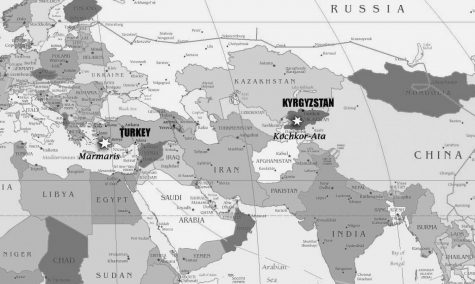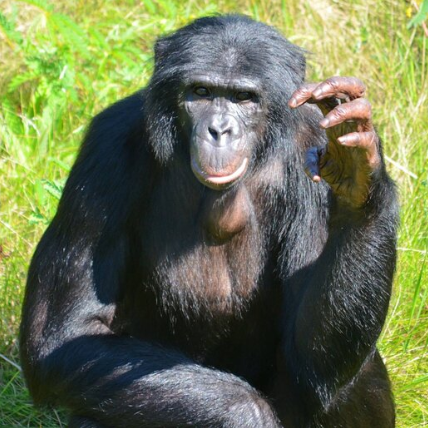Coming to America
In the early days of March, senior Aizat Sarybaeva received the phone call of a lifetime in her cozy home in Kyrgyzstan. Every exam, interview, and medical test instantly became worth it as she was notified of her acceptance into the World Link student exchange program. Out of the 1,000 students in Kyrgyzstan who applied, Sarybaeva was one of the one hundred students selected to participate in this adventure.
After all her hard work, there was only one thing left to do: hug and cry with her family in celebration of her deserving success. The unknown, yet exciting opportunities ahead kept Sarybaeva up at night for days.
“I was really happy that I would have an American host family and siblings the same age. It was unbelievable,” said Sarybaeva.
Just a few short months later, on July 21, Sarybaeva stepped off the plane and onto the fresh soil that was the United States of America.
Sarybaeva spent the next two weeks in Wisconsin, where she attended an English immersion camp. On August 5, she arrived in Des Moines, Iowa to join four other exchange students on an unforgettable educational journey as seniors at Southeast Polk High School.
Life as a foreign exchange student has been nothing but learning inside and outside of the classroom. Adjusting to a different culture and lifestyle is challenging enough, let alone throwing a school of 2,500 students into the mix.
“The size [of Southeast Polk] is way bigger,” said Sarybaeva. “My old school only had two floors and a population of 1,000 students from elementary to high school.”
The size of Southeast Polk is just the icing on the cake. Sarybaeva says she is still getting used to how fast Americans talk and how computers are used for everything.
Counselor Jessica Nolting has been the designated counselor for exchange students for five years. She is in charge of keeping tabs on each student throughout the year. Nolting prefers to meet with them as a group every six weeks to make sure they’re doing well.
Nolting says she has noticed that the hardest thing for the exchange students to adjust to is the length of the school day.
“Our day starts at 7:50 a.m. and it goes until 3 p.m. A lot of the foreign exchange students come from places where school doesn’t happen for that long,” said Nolting. “They might have a lot of studying time outside of school on their own, but just that scheduled time during the day looks different.”
For Sarybaeva, a regular school day in Kyrgyzstan only lasts four to five hours. Instead of having the same classes every day, students would only have math and science twice a week, and P.E. once a week depending on grade. Taking the same class on the same schedule every day is very new to Sarybaeva.
Turkish senior Doga Huner is another foreign exchange student taking on this opportunity with Sarybaeva. The school day may be longer by a few hours in Turkey, but there are also other things Huner is learning to adjust to.
“I thought it would be easier to find my classes,” said Huner. “Like, sometimes five minute breaks can make it hard to make friends and talk to teachers. But I am getting used to the system.”
But the students refuse to let these difficulties stop them from learning more about the American culture and exploring everything the school has to offer. Both Sarybaeva and Huner are especially happy with being able to take classes that correspond with their personal interests, something they could not do in their home countries.
“I like the French language. Learning a new language is enjoyable for me,” said Huner. “I liked adding calculus to my schedule too, even if it can be challenging.”
Sarybaeva and Huner plan on getting involved in as many activities as possible all throughout the school year. Both have goals to become leaders, make new friends, volunteer, and especially learn more about American sports.
“Americans love sports so much,” Sarybaeva said. “Soccer is common in Kyrgyzstan, but we do not have baseball or American football. So it was interesting learning about them at the assemblies.”
Huner is excited to join tennis in the spring. She believes playing a sport teaches punctuality and organization. She hopes to bring something new to the team.
This school year will be an educational experience for each of the exchange students, school-wise and culturally. But the benefits of learning a new way of life are not contained to the foreign exchange students.
Nolting says there’s a lot that the Southeast Polk student body could learn from the exchange students, from their perspective to their understanding of the world. That they bring something students don’t often have access to. The more connected everyone is, the more understanding there will be.
“Every student I’ve met is unique and interesting and has their own story to tell,” says Nolting. “Not unlike our students here because everyone has a story to tell, but it’s just always fun for me to learn about their ways of life and how they are both similar to and different from the experience of a lot of students here. I learn just as much as I think they do.”

bordered by Syria, Iraq, and Iran and has a population of about 80 million people. Tai Duong map.



